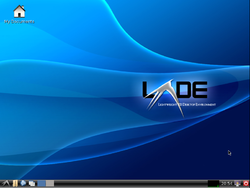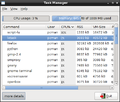| LXDE | |
|---|---|
 | |
 Default LXDE desktop | |
| Original author | Hong Jen Yee ("PCMan") |
| Developer | The LXDE Team |
| Initial release | 2006 |
| Final release | |
| Repository | |
| Written in | C (GTK 2, GTK 3) |
| Operating system | Unix-like |
| Platform | Linux, BSD |
| Type | Desktop environment |
| License | GPL, LGPL |
| Website | www |
LXDE (abbreviation for Lightweight X11 Desktop Environment) is a free desktop environment with comparatively low resource requirements. This makes it especially suitable for use on older or resource-constrained personal computers [2] such as netbooks or system on a chip computers.
Contents
- History
- Qt port
- GTK 3 port
- Current development
- Availability
- Software components of LXDE
- See also
- References
- External links
LXDE was written in the C programming language, using the GTK 2 toolkit, and runs on Unix and other POSIX-compliant platforms, such as Linux and BSDs. The LXDE project aims to provide a fast and energy-efficient desktop environment. [3] [4]
LXDE uses rolling releases for its individual components (or for groups of components with coupled dependencies). [5] The default window manager used is Openbox, but one can configure a third-party window manager for use with LXDE, such as Fluxbox, IceWM or Xfwm. [4] LXDE includes GPL-licensed code as well as LGPL-licensed code. [3]








